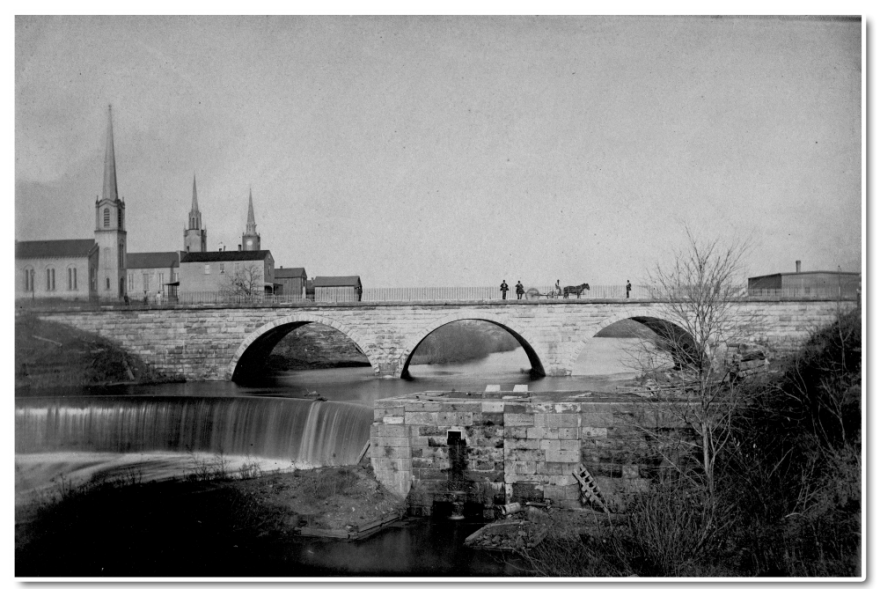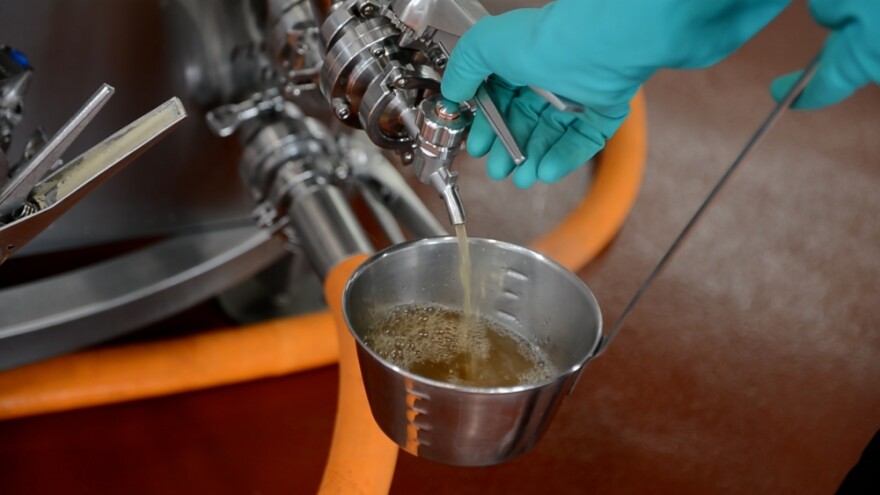Makers: Jennifer Hermann, Co-Founder & Head Brewer; Ryan Tipton, Co-Founder & General Manager; Bridget Tipton, Co-Founder & Designer
Business: Bell Tower Brewing Co., a craft brewery in Kent housed in a historic church building
How did you all meet?
Ryan: Jennifer and I met about 10 years ago. A mutual friend connected us to Jennifer, who was hosting a local homebrew demonstration in her driveway. And I at the time was just getting into homebrewing my own beer. Jennifer had been doing it for about 15 years by that point. After connecting on the homebrew level, five years later, we got serious about pursuing a brewery in Kent. And after a few conversations, we realized our mission and vision really aligned on bringing a neighborhood brewery to Kent, Ohio, which is our hometown.

Jennifer, you’ve developed quite a history with beer. Tell me about your brewing background.
I started home brewing about 23 years ago. I'm still pretty fascinated by the whole fermentation process and by the whole combination of art and science that brewing brings. I got into professional brewing about 2011. I was at Market Garden in Ohio City under Andy Tveekrem, who showed me the ins and outs of what it takes to run a commercial facility. I was there for about four-and-a-half years and then went to Lancaster, Ohio, to Rockville Brewery, where I helped them transition from a one-and-a-half barrel to a 15-barrel system before I moved back to Kent to eventually meet Ryan to talk about a vision of bringing fresh, local beer to Kent.

What’s the history behind this beautiful building, the former First Congregational Church that now houses Bell Tower Brewing Co.?
Bridget: We are the third group to take care of this property since it was built in 1858. Ultimately at the beginning, it was built for large gatherings, but the building has been used for a lot of different things over time. There was a car wash, an artist’s studio, some apartments, office space, a machine shop. It’s held a lot of different functions over its long life. There have been three additions to the building, and the area that the brewery is now in was built in 1915, and that was the last addition. So there’s a lot of history that’s already taken place here.


With your long career in beer, Jennifer, I imagine there’s been a lot of experimentation, a lot of trial and error. What have been some challenges you’ve conquered in your years of learning?
Yes, a lot of trial and error, especially when you're in a new brew house and learning its capabilities, learning my limitations and vice versa. There are a lot of wonderful things about this equipment. It's beautiful, expensive, shiny equipment that does very simple things. And once you understand that, then it's a little bit less intimidating if you understand the mechanics of how basic things work, and the basic process of turning raw materials into wort, or fermented beer.

Hermann explains how the 12 tap system works. [Jean-Marie Papoi / Ideastream Public Media]
I just think it’s the best job in the world. All the time I had spent in my basement, in the garage, in the driveway, making mistakes, dumping beer, all of those things led me to this place where hopefully I won’t be dumping beer and I won’t be making too many mistakes. And I can still come up with a well-balanced product that hits the style marks for me, but is also an enjoyable product. I became a certified cicerone, so I understand the finer art of serving beer, how it should look, how it should be presented. I was also a philosophy major at Kent State, and also studied psychology and religion, so I love that those three things brought me into a church where the beer that we’re creating is being served. Sometimes it seems like the only reason why I’m here is to brew beer. I found my purpose.
Since Bell Tower opened in October of 2021, what has the reception in the community been like for you?
Ryan: Overwhelming. It was beyond wonderful. We couldn't have chosen a better response from the community as soon as we opened our doors. So much so that we had to scale back our food operations a little bit just to handle the volume of people coming through the door.
Bridget: It's crazy to imagine people who you just don't know at all willing to come here and support the business, and come again. We've had a lot of people who have come multiple times and we already have those regulars. And that's the coolest thing, meeting new people that are neighbors. I mean, we live here and they’re our neighbors and they're the neighbors of the business. But we hadn't had the chance to meet until serving a pint over the bar. That's special and that's been probably the best part about opening.

It’s no secret to anyone that it’s rare to find a female brewer in the industry. Jennifer, can you speak a bit to your experiences of being in this male-dominated field?
I used to get asked that question all the time. Nobody has asked me in the past year, which I’m grateful for, and goes to show you how much our world has changed, especially since 2016, especially with the idea that women can do anything that men can do. When I would get asked that question 10 years ago, I brewed with two other male assistant brewers, both of whom were younger than me. So not only did I have an age disadvantage, but I also had a gender disadvantage. And they’d ask me, ‘What’s the biggest challenge?’ And I’d say, ‘The biggest challenge is that I can’t talk to my colleagues about the questions you’re asking me, because they have no idea what it’s like to be in my position.’ I still get glances at the bar when I’m introduced as the brewer.

Hermann pours a sampling of wort, or unfermented beer, that is produced from converting the starches of malted grains into sugar. [Jean-Marie Papoi / Ideastream Public Media]
I’m grateful that I’m not asked as often anymore, but the humor in me wants to be asked so desperately, like I still want people to say ‘You can’t do it. You’re not as good as them.’ There are certain sensibilities that women bring to beer that maybe the other gender hasn't quite refined, I guess might be a politically correct way of saying that my sensibilities are different, which I think is fair. Studies have shown that women are a little more sensitive to flavors and to aromas and to the way that it feels, kind of like the romantic side of it. Not that males aren't. But I think there is a difference.
Now that you’ve reached this point and have this beautiful brewery, do you feel proud? Accomplished?
Jennifer: I do feel proud. I feel more proud now that I have the tenacity and the wherewithal to hold on to what I thought could be real. And I think right now I'm in that state between what we dreamed up - this idea and this great space - and now I'm in the ‘doing’. And so that transition from dreaming into doing has been interesting. I like to think there's two kinds of people: There's the ones that are scared to succeed and the ones that are scared to fail. And I think I fall somewhere in the middle. I think I've been really scared to fail. But you don't know you're going to fail until you actually try it.

Copyright 2021 WCPN. To see more, visit WCPN.


